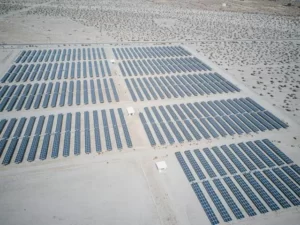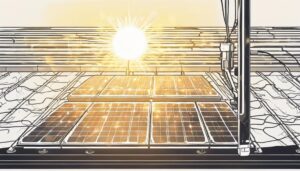You may not be aware that off-grid solar storage systems offer a way to harness and store excess energy generated by solar panels, allowing you to power your home independently from the traditional grid.
But why should you consider this option for your energy needs?
Well, imagine being able to rely on a sustainable and reliable source of power, while also reducing your reliance on fossil fuels and decreasing your carbon footprint.
These are just a few of the compelling reasons to explore the benefits of off-grid solar storage.
Key Takeaways
- Off-grid solar storage reduces reliance on traditional grid systems and promotes a greener environment.
- Sustainable solar storage provides energy independence and scalability to suit specific energy needs.
- Off-grid systems offer cost-effectiveness by reducing the need for grid power and achieving energy independence.
- There are various battery storage options available for off-grid solar systems, including lithium-ion and lead-acid batteries.
Top Reasons for Off-Grid Solar Storage In Australia
There are several reasons why off-grid solar storage is becoming increasingly popular in Australia:
- Energy Independence: Off-grid solar storage allows homeowners to generate their electricity and become less reliant on the traditional power grid. This provides a sense of energy independence and reduces the risk of power outages.
- Cost Savings: By generating their electricity, homeowners can significantly reduce their energy bills. The initial investment in off-grid solar storage systems may be higher, but the long-term savings can be substantial.
- Environmental Benefits: Solar energy is a clean and renewable source of power, which helps reduce carbon emissions and combat climate change. Off-grid solar storage systems enable homeowners to reduce their carbon footprint and contribute to a more sustainable future.
- Remote Locations: Australia has many remote areas where it is expensive or impractical to connect to the power grid. Off-grid solar storage provides a reliable and cost-effective solution for generating electricity in such locations.
- Power Stability: Off-grid solar storage systems often include battery storage, which allows homeowners to store excess energy generated during the day for use at night or during cloudy days. This ensures a stable and uninterrupted power supply.
- Government Incentives: The Australian government offers various incentives, such as rebates and feed-in tariffs, to promote the adoption of renewable energy systems like off-grid solar storage. These incentives make it more financially attractive for homeowners to invest in such systems.
These are some of the top reasons why off-grid solar storage is gaining popularity in Australia.
Understanding Energy Independence
When striving for energy independence, you can rely less on traditional grid systems and take control of your energy needs. This shift towards energy independence brings numerous benefits.
By utilizing off-grid solar systems, you can reduce reliance on fossil fuels, leading to a decrease in carbon emissions and contributing to a greener environment. Off-grid solar storage allows for the generation, storage, and distribution of electricity independent of the traditional power grid, providing a reliable source of energy. This is especially valuable in remote locations and during power outages or emergencies.
Additionally, integrating home battery storage solutions addresses the intermittent nature of solar power generation, enabling a seamless transition towards renewable energy sources. Embracing energy independence not only offers greater control over your energy usage but also promotes sustainability and resilience.
Advantages of Sustainable Solar Storage
Let’s explore the advantages of sustainable solar storage and how it can help you reduce reliance on traditional grid systems while maximizing the use of solar energy.
- Advantages of Sustainable Solar Storage
- Energy Independence: By harnessing solar energy and storing it, you can reduce dependence on the traditional power grid, giving you greater control over your energy usage and costs.
- Scalability: Sustainable solar storage solutions can be tailored to suit your specific energy needs. The system can be easily expanded or adjusted as your requirements change, providing flexibility and efficiency.
With sustainable solar storage, you can enjoy a range of benefits, including a decreased reliance on the grid, minimized power outages, and reduced exposure to fluctuating energy prices.
Additionally, by maximizing the use of solar energy through reliable storage solutions, you can contribute to the transition towards renewable energy sources.
Embracing sustainable solar storage not only offers immediate advantages but also paves the way for a more sustainable and environmentally friendly energy future.
Cost-Effectiveness of Off-Grid Systems
Considering the long-term cost savings and reliable electricity provision, off-grid solar systems paired with energy storage solutions offer a cost-effective alternative for both residential and commercial energy needs.
By reducing reliance on traditional grid electricity, off-grid solar systems can lead to significant financial savings over time. The use of solar panels combined with energy storage solutions maximizes the utilization of solar energy, thus reducing the need for grid power, which can be costly.
This approach not only provides cost savings but also contributes to grid independence, particularly in remote locations where establishing grid infrastructure would be prohibitively expensive.
The flexibility and scalability of off-grid solar storage systems further enhance their cost-effectiveness, making them suitable for a wide range of energy needs, from small residential setups to larger commercial applications.
Additionally, by storing excess solar energy for later use, off-grid solar storage systems offer a cost-effective way to achieve energy independence and reduce reliance on fluctuating energy prices.
This makes off-grid solar storage a financially attractive option for those seeking reliable, sustainable, and cost-effective energy solutions.
Exploring Battery Storage Options
To explore battery storage options for your off-grid solar system, consider the various high-energy capacity and long-life storage solutions available to meet your diverse energy needs. When comparing battery technologies, it’s essential to evaluate installation requirements to ensure seamless integration with your off-grid solar setup.
Here are some key points to consider:
Lithium-ion Batteries:
- Known for their high energy density and long cycle life.
- They are often lightweight and compact, making them suitable for various installation locations.
Lead-Acid Batteries:
- A more traditional option with proven reliability.
- Generally more affordable upfront but may require more frequent maintenance and have a shorter lifespan compared to lithium-ion batteries.
These options provide a glimpse into the diverse landscape of battery storage technologies available for off-grid solar systems. By evaluating installation requirements and understanding the differences between various battery technologies, you can make an informed decision that aligns with your energy goals and off-grid lifestyle.
Sizing Your Solar Storage System
As you explore battery storage options for your off-grid solar system, it’s essential to understand the importance of accurately sizing your solar storage system to meet your specific energy needs. Conducting an energy consumption analysis is crucial in determining the storage capacity required to support your lifestyle or business operations.
By calculating your daily energy consumption patterns and the required energy generation, you can effectively size your solar storage system. Seek assistance from a licensed electrician or renewable energy specialist to ensure that the solar storage system’s size aligns with your energy needs and integrates seamlessly with your existing solar panels.
Tailoring your solar storage system to meet your specific energy requirements is key to maximizing its benefits and ensuring a reliable power supply. Use the gathered information to make informed decisions about the size and type of solar storage system that best suits your needs.
Surprising Facts About Top Reasons for Off-Grid Solar Storage In Australia
- 🌞 Australia boasts one of the highest solar radiation levels globally, making it an ideal location for off-grid solar storage solutions.
- 🏡 The remote areas of Australia, often off-grid, rely heavily on solar storage to meet their energy needs, fostering sustainability in otherwise challenging environments.
- 🦘 Off-grid solar storage is gaining popularity in rural communities, where the cost of extending the power grid is often impractical compared to investing in localized renewable energy solutions.
- 🔄 Grid-independent solar storage systems in Australia not only reduce carbon footprints but also contribute to decreased reliance on traditional power infrastructure, promoting resilience.
- 💡 Innovative solar storage projects are being implemented in Indigenous communities, empowering them with clean energy and promoting self-sufficiency.
- 📈 The falling costs of solar technology and the rise in energy demand are driving increased adoption of off-grid solar storage solutions across various sectors in Australia.
- 🏞️ Off-grid solar storage supports conservation efforts in remote natural habitats, providing sustainable energy solutions without disturbing delicate ecosystems.
- 🛠️ Small-scale off-grid solar storage systems are being used creatively in construction projects, offering portable and reliable power sources in remote construction sites.
- 🚐 Australia’s nomadic population is embracing mobile off-grid solar solutions, with compact setups powering camper vans and caravans as they traverse the vast landscapes.
- 🌏 Beyond residential and commercial use, off-grid solar storage is being explored for disaster response, providing crucial power sources in emergencies across the continent.
Frequently Asked Questions
How Much Does a 10kW Off-Grid Solar System Cost?
A 10kW off-grid solar system can cost between $20,000 to $40,000, varying by location and components. When comparing costs, factor in battery storage and installation. For maintenance tips, consult a professional for guidance.
What Is the Best Off-Grid Power Source?
When considering the best off-grid power source, weigh the pros and cons of solar, wind, and hydro options. Solar offers low maintenance and abundant energy but can be inconsistent. Explore alternative options for reliable, sustainable power.
How Many Solar Panels Do You Need to Get off the Grid?
To get off the grid, you’ll need to calculate the capacity based on your energy needs and solar panel efficiency. Consider daily consumption, peak sun hours, and location. It’s important to consult a professional for accurate sizing.
What Happens With Excess Solar Power in an Off-Grid System?
When you have excess solar power in an off-grid system, maximizing efficiency is key. Proper surplus management involves using the energy immediately, storing it for later, or even selling it back to the grid, depending on local regulations.
Conclusion
Off-grid solar storage systems offer a compelling solution for achieving energy independence and reducing reliance on traditional grid systems. By harnessing and storing excess energy generated by solar panels, these systems provide a sustainable and reliable source of power.
The advantages of sustainable solar storage include energy independence, scalability to suit specific energy needs, and cost-effectiveness by reducing the need for grid power. Battery storage options, such as lithium-ion and lead-acid batteries, can be tailored to meet diverse energy requirements.
Accurately sizing the solar storage system is crucial for maximizing its benefits. Overall, off-grid solar storage enables individuals and businesses to embrace sustainable and environmentally friendly energy solutions while reducing carbon emissions and enjoying long-term cost savings.



